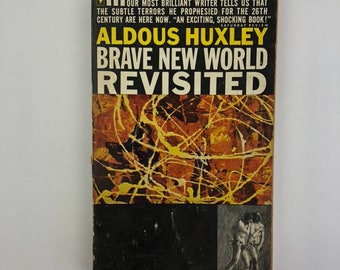
An early trip to the United States gave Brave New World much of its character. Huxley used the setting and characters from his science fiction novel to express widely held opinions, particularly the fear of losing individual identity in the fast-paced world of the future. Accordingly, many of the novel's characters are named after widely recognised, influential and in many cases contemporary people ( see below). The political, cultural, economic and sociological upheavals of the Russian Revolution of 1917 and the First World War (1914–1918) were resonating throughout the world as a whole and the individual lives of most people. Mass production had made cars, telephones, and radios relatively cheap and widely available throughout the developed world.

The Industrial Revolution had transformed the world. The introduction to the most recent print of Brave New World states that Huxley was inspired to write the classic novel by this Billingham visit.Īlthough the novel is set in the future it deals with contemporary issues of the early 20th century. Huxley visited the newly opened and technologically advanced Brunner and Mond plant, part of Imperial Chemical Industries, or ICI, Billingham, United Kingdom, and gives a fine and detailed account of the processes he saw. According to We translator Natasha Randall, Orwell believed that Huxley was lying. However, in a 1962 letter, Huxley says that he wrote Brave New World long before he had heard of We. George Orwell believed that Brave New World must be partly derived from the novel We by Yevgeny Zamyatin. Huxley referred to Brave New World as a "negative utopia", somewhat influenced by Wells' own The Sleeper Awakes (dealing with subjects like corporate tyranny and behavioural conditioning) and the works of D. Wells," but then he "got caught up in the excitement of own ideas." Unlike the most popular optimist utopian novels of the time, Huxley sought to provide a frightening vision of the future. Arthur Goldsmith, an American acquaintance, that he had "been having a little fun pulling the leg of H.

Wells' hopeful vision of the future's possibilities gave Huxley the idea to begin writing a parody of the novel, which became Brave New World. Wells, including A Modern Utopia (1905) and Men Like Gods (1923). Huxley said that Brave New World was inspired by the utopian novels of H. Brave New World was Huxley's fifth novel and first dystopian work. He was a contributor to Vanity Fair and Vogue magazines, and had published a collection of his poetry ( The Burning Wheel, 1916) and four successful satirical novels: Crome Yellow (1921), Antic Hay (1923), Those Barren Leaves (1925), and Point Counter Point (1928). By this time, Huxley had already established himself as a writer and social satirist. Huxley wrote Brave New World in 1931 while he was living in Italy. Translations of the title often allude to similar expressions used in domestic works of literature in an attempt to capture the same irony: the French edition of the work is entitled Le Meilleur des mondes ("The Best of All Worlds"), an allusion to an expression used by the philosopher Gottfried Leibniz and satirised in Candide, Ou l'Optimisme by Voltaire (1759). Huxley employs the same irony when the "savage" John refers to what he sees as a "brave new world". However, what she is actually observing is not men acting in a refined or civilized manner, but rather drunken sailors staggering off the wreckage of their ship.

When she sees other people for the first time, she is understandably overcome with excitement, and utters, among other praise, the famous line above. This line itself is ironic Miranda was raised for most of her life on an isolated island, and the only people she ever knew were her father and his servants, an enslaved savage, and spirits, notably Ariel. William Shakespeare, The Tempest, Act V, Scene I, ll. O wonder! How many goodly creatures are there here! How beauteous mankind is! O brave new world, That has such people in't. 8 Comparisons with George Orwell's Nineteen Eighty-Fourīrave New World's title derives from Miranda's speech in William Shakespeare's The Tempest, Act V, Scene I:.7 Censorship/banning instances, accusation of plagiarism.3.3 The Savage visits the World State (Chapters 10–18).3.2 The Reservation and the Savage (Chapters 7–9).



 0 kommentar(er)
0 kommentar(er)
